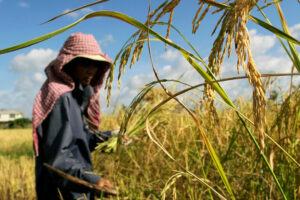By Kyle Aristophere T. Atienza, Reporter
THE GOVERNMENT needs to pursue more agro-food deals with the rest of Southeast Asia to address still-high food costs, economists and industry officials said.
They were commenting on the Philippine-Cambodia agriculture partnership signed last week allowing the Philippines to invest in Cambodian rice production, specifically milling, possibly paving the way for future collaboration in animal feed.
“We need to pursue food-related deals with our ASEAN partners not only for our food security but also as a signatory to the Regional Cooperation and Economic Partnership (RCEP),” according to Danilo V. Fausto, president of the Philippine Chamber of Agriculture and Food, Inc.
“Fisheries and processed fruits and coconut products have good growth potential because of our ASEAN partnership,” he said via Viber.
Mr. Fausto said the Philippines needs to enter into government-to-government arrangements with its ASEAN partners “with respect to rice and other essential food imports to bring down prices of our food products.”
The Philippines has declared a food security emergency, citing an “extraordinary” spike in the prices of the grain despite lower import tariffs.
In 2024, Philippine rice imports hit a record 4.68 million metric tons (MMT), from 3.6 MMT a year earlier.
“While cooperation with Cambodia offers many benefits, limiting engagement to just one country would miss out on diverse trade, investment, and innovation opportunities,” Leonardo A. Lanzona, an economics professor at the Ateneo de Manila, said.
“A multi-country approach is much better in strengthening resilience, enhancing competitiveness, and maximizing agricultural growth,” he added via Messenger chat.
The Department of Agriculture said last week that Cambodia will gradually be an important agricultural trading partner “as the Philippines diversifies its markets, particularly for rice.”
The deal with Cambodia “envisions enhanced collaboration in agricultural planning, animal feed development, animal health protection, irrigation management, and agricultural marketing systems,” it said.
The DA said both countries will also explore the exchange of non-geographical indication-protected plant commodities to foster agricultural diversity and innovation.
It said discussions were underway to explore trade in vegetables and meat.
Roy S. Kempis, director of the Center for Business Innovation at the Angeles University Foundation, said the Philippines should also consider long-term partnerships with Vietnam and Thailand.
“Others which have vast tracts of land that can produce food include Myanmar, Cambodia, and Malaysia,” he added via Viber.
He backed pursuing ties with countries that have renewable energy technology in irrigation, such as Singapore, Vietnam, and Thailand.
Areas in the Philippine food chain that have the potential to grow significantly due to ASEAN ties include rice milling, shipping and distribution, research and development, irrigation, and renewable energy, according to Mr. Kempis.
He said deals with ASEAN neighbors should aim for advanced technology and rice milling R&D.

